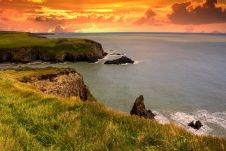UK consortium secures backing to improve marine biodiversity monitoring
A consortium of USV and hydroacoustic tech firms, including ACUA Ocean, GeoAcoustics and Unmanned Survey Solutions (USS), has secured funding from the British Department for Environment, Food and Rural Affairs (Defra) for Phase 2. Its demo aims to merge advanced technologies for mapping and assessing seagrass meadows, offering greener and more efficient alternatives to current sonar-based methods.
USS previously incorporated a GeoSwath 4 sonar system and collaborated with GeoAcoustics on a project aimed at providing fully automated end-to-end bathymetric solutions. This groundwork sets the foundation for the current project. While single-beam echosounders have historically been employed for seagrass mapping, their effectiveness is constrained by their narrow beams, which only survey a limited strip of the seabed per ping. In contrast, this project adopts a strategy leveraging the wide swath capabilities of the GeoSwath system, promising substantial gains in efficiency.
Interferometric sonar
The project will use an advanced interferometric sonar system capable of transmitting sonar beams over 40 times wider than a typical single-beam sonar system, allowing for greater spacing between survey lines and significantly reduced survey times. The GeoSwath 4 bathymetric sonar features an onboard artificial intelligence system to automate data processing and extract seagrass height estimates in real time. Survey and water-quality systems will be deployed from a carbon-neutral USV to further reduce environmental impact and operating costs.
“Defra is proud to announce its investment in UK SMEs that are advancing next-generation marine monitoring technologies as components of complete end-to-end monitoring systems. These innovative systems are pivotal to advancing our biodiversity observation capabilities in UK waters and will contribute to strengthening our evidence base as we progress towards the UK’s vision for clean, healthy, safe, productive and biologically diverse seas,” said Vicki Castro-Spokes, programme director for Defra’s Marine Natural Capital & Ecosystem Assessment Programme.
Seagrass mapping
Project lead, James Williams, CEO of Unmanned Survey Solutions, said: “USS has worked with GeoAcoustics on a variety of projects where we have integrated the GeoSwath wide swath bathymetry system and GeoPulse compact sub-bottom profiler systems. This new project will be a game-changer for seagrass mapping efficiency due to the wide seabed coverage from every survey line. Combined with GeoAcoustics’ new AI processing and ACUA Ocean’s Natural Capital Assessment tool, our ability to transmit raw data to anywhere in the world will give scientists access to real-time data, allowing them to make critical decisions during survey operations.’’
Dr Richard Dowdeswell, COO of GeoAcoustics, stated: “GeoAcoustics is delighted to be working with both USS and ACUA Ocean on this exciting project which opens up further applications for our proven sonar technology while demonstrating the operational benefits that our new AI solution unlocks.”
Speaking on the announcement, ACUA Ocean CEO Neil Tinmouth said: “ACUA has been working on the development of a Natural Capital Assessment tool for aiding the visualization of holistic ocean habitat data. The project builds on the work conducted by ACUA during Phase 1 of the Defra grant. AO has end-user and potential customers already interested in the systems and services delivered during this project.”















